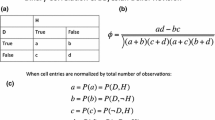Abstract
The paper outlines a conceptual framework for the critical assessment of argumentation which differs in some of its core characteristics from conventional approaches: it is resolutely semantic rather than formal in its method; it centers on obligations rather than beliefs; and its analytical focus is on the contingent necessity of conclusions, rather than on their persuasiveness or formal validity. The paper briefly illustrates the applications of this conceptual framework by reanalyzing a couple of examples taken from the argumentation analysis literature.
Similar content being viewed by others
REFERENCES
Aristotle: 1975, The 'Art' of Rhetoric. Translated by J. H. Freese, Harvard University Press, Cambridge, Massachusetts.
Black, M.: 1962, Models and Metaphors: Studies in Language and Philosophy, Cornell University Press, Ithaca, NY.
Blair, A. and R. H. Johnson: 1987, 'Argumentation as Dialectical', Argumentation 1, 41–56.
Fisher, A.: 1992, 'Critical Study: Dialectics and the Macro Structure of Argument by James B. Freeman', Informal Logic XIV, 193–204.
Freeman, J. B.: 1991, Dialectics and the Macro Structure of Arguments: A Theory of Argument Structure, Foris Publications, New York.
Gilbert, M. A.: 1991, 'The Enthymeme Buster: A Heuristic Procedure for Position Exploration in Dialogic Dispute', Informal Logic 13(2), 159–166.
Girle, R. A.: 1992, 'Reasoning, Interrogatives, and Imperatives', in P. D. Jewell (ed.), On the Same Premises. Proceedings of the Second National Conference on Reasoning. Flinder, University of South Australia: Philosophy Department, pp. 123–134.
Glaser, J.: 1992, 'Taking the Inference Out of Reasoning', in P. D. Jewell (ed.), On the Same Premises, Proceedings of the Second National Conference on Reasoning. Flinder, University of South Australia: Philosophy Department, pp. 85–98.
Goodman, N.: 1983, Fact, Fiction and Forecast (fourth edition), Harvard University Press, Cambridge, Massachusetts.
Gottlieb, G.: 1968, The Logic of Choice: An Investigation of the Concept of Rule and Rationality, Allen and Unwin, London.
Govier, T.: 1992, A Practical Study of Argument, third edition, Wadsworth, Belmont, California.
Govier, T.: 1988, A Practical Study of Argument, second edition, Wadsworth, Belmont, California.
Govier, T.: 1985, 'Logical Analogies', Informal Logic VII, 27–33.
Greeno, J. G. and H. A. Simon: 1988, 'Problem Solving and Reasoning', in R. C. Atkinson, R. J. Hernstein, G. Lindzey and R. D. Luce (eds.), Stevens' Handbook of Experimental Psychology, second edition, Wiley, New York. Volume II, Chapter 9, pp. 589–672.
Grice, P.: 1989, Studies in the Way of Words, Harvard University Press, Cambridge, Massachusetts.
Inbar, M.: in preparation, The Critical Assessment of Argument: Elements of a Conceptual Framework of Analysis.
Johnson, R. H. and J. A. Blair: 1994, Logical Self-Defense (United States edition), MacGraw-Hill, New York.
Johnson-Laird, P. N.: 1988, The Computer and the Mind: An Introduction to Cognitive Science, Harvard University Press, Cambridge, Massachusetts.
Lambert, K. and W. Ulrich: 1980, The Nature of Argument, MacMillan, New York.
Levi, D. S.: 1995, 'The Case of The Missing Premise', Argumentation 17, 67–88.
Newell, A.: 1990, Unified Theories of Cognition, Harvard University Press, Cambridge, Massachusetts.
Newell, A. and H. A. Simon: 1972, Human Problem-Solving, Prentice-Hall, Englewood Cliffs, NJ.
Pavelin, C.: 1988, 'Logic in Knowledge Representation', in G. A. Ringland and D. A. Duce (eds.), Approaches to Knowledge Representation — An Introduction, Wiley, New York, pp. 13–43.
Perelman, Ch. and L. Olbrechts-Tyteca: 1969/[1958], The New Rhetoric: A Treatise on Argumentation, University of Notre Dame, Notre Dame, Indiana.
Rapoport, A.: 1970, Fights, Games and Debates (fourth printing), The University of Michigan Press, Ann Arbor.
Scriven, M.: 1976, Reasoning, McGraw-Hill, New York.
Sherif, M. and C. W. Sherif: 1969, Social Psychology, Harper and Row, New York.
Simon, H. A.: 1991, 'Alternative Representations for Cognition: Search and Reasoning', Complex Information Processing Working Papers # 485. Department of Psychology, Carnegie-Mellon University, Pittsburgh, Pennsylvania.
Smith, E. E.: 1989, 'Concepts and Induction', in M. I. Posner (ed.), Foundations of Cognitive Science, MIT Press, Cambridge, Massachusetts, pp. 501–526.
Steinbruner, J. D.: 1974, The Cybernetic Theory of Decision, Princeton University Press, Princeton, NJ.
Toulmin, S. E.: 1958, The Uses of Argument, Cambridge University Press, Cambridge.
Toulmin, S., R. Rieke and A. Janik: 1984, An Introduction to Reasoning, second edition, Macmillan, New York.
von Wright, G. H.: 1983, Practical Reason, Cornell University Press, Ithaca, NY.
Walton, D. N.: 1989, Informal Logic, Cambridge University Press, Cambridge.
Woods, J.: 1988, 'Ideals of Rationality in Dialogic', Argumentation 2, 395–408.
Author information
Authors and Affiliations
Rights and permissions
About this article
Cite this article
Inbar, M. Argumentation as Rule-Justified Claims: Elements of a Conceptual Framework for the Critical Analysis of Argument. Argumentation 13, 27–42 (1999). https://doi.org/10.1023/A:1007703608951
Issue Date:
DOI: https://doi.org/10.1023/A:1007703608951




